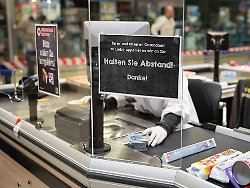Friday, May 7th, 2021
Jobs at Edeka or in the snack bar
The strange part-time jobs of federal officials
Since the mask affair, the public has been sensitized to lucrative part-time jobs for elected officials. In contrast, the part-time jobs of federal officials seem almost bizarre: They work as testers of computer games, in the snack bar or sit at the Edeka checkout. One ministry in particular is represented.
In around 450 cases in the current legislative period, federal civil servants mainly carried out paid secondary employment in private companies. This emerges from the answer from the Ministry of the Interior to a small request from the Left Group that the “Rheinische Post” has received. According to this, more than 200 secondary jobs were carried out by officials of the Ministry of Finance. They earned money by brokering insurance, selling cosmetics, caring for pets, teaching, giving lectures or being a partner in a wine trade. Obviously, the service for Finance Minister Olaf Scholz is less exhausting than posts in other ministries.
According to the report, a tax officer even had time to work as a product tester for computer games. The federal employees did not disdain employment in the low-wage sector either: an official from the Ministry of Family Affairs worked in a snack bar on the side. The Ministry of the Interior allowed a civil servant to work on the side at Edeka at the cash register, the paper quoted from the answer from the Ministry of the Interior.
When it comes to exchanging services with the private sector, the federal government made a particularly bad cut: the federal government lent more than 800 civil servants to companies in the current legislative period. Conversely, 28 external workers have worked temporarily in the federal ministries during this period, most of them in the Foreign Office.
Bundestag is working on stricter transparency rules
Most recently, allegations of corruption relating to the procurement of protective equipment in the Corona crisis ensured that a large majority in the Bundestag agreed on tougher transparency rules for members of parliament. A joint bill by the CDU / CSU, SPD, the Greens and the Left, which was discussed for the first time at the end of April, is intended to ensure that processes such as the mask or Azerbaijan affair cannot be repeated.
To this end, paid lobbying by members of parliament towards the federal government or the Bundestag as well as the acceptance of donations are to be prohibited in future. This also applies to fees for lectures in connection with parliamentary work. Additional income must be stated from 1000 euros per month or 3000 euros per year. Shareholdings in corporations and partnerships must be displayed and published from 5 percent (previously 25 percent). Income from such participations as dividends or profit distributions must be disclosed as well as stock options.
.
